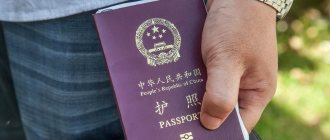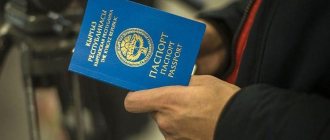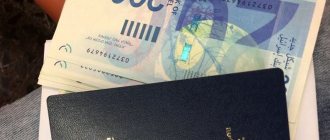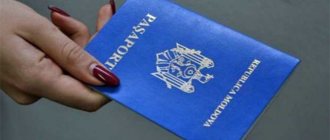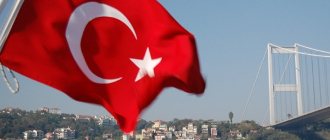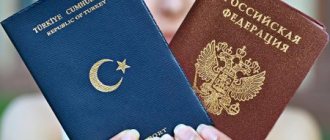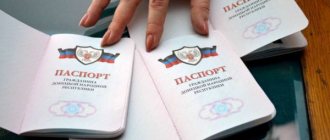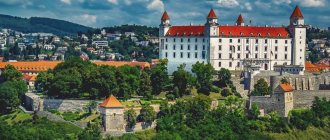Ticket difficulty level
The degree of difficulty of the questions developed as part of the comprehensive citizenship examination largely depends on the level of preparation of the examinee.
To a large extent, tests for obtaining citizenship are based on the school curriculum, and testing samples contain questions regarding the most significant dates in the history of Ancient Rus', Russia of the 18th - 19th centuries, and the USSR. There is also a block of questions regarding the legislation of modern Russia and tasks that allow you to identify your level of Russian proficiency.
For an educated Russian-speaking person, passing the exam to obtain Russian citizenship will not be particularly difficult. Sometimes no preparation is required at all.
If we are talking about foreigners who arrived from some post-Soviet states, where sometimes the Russian language is taught no more than twice a week and is often at a very deplorable level, passing this exam can become a very serious test (about the peculiarities of obtaining Russian citizenship by foreigners , can be found here). However, with a competent approach to preparation and high-quality study of the material, you can easily successfully pass all three modules.
In addition, a very big help when passing is to set a minimum response threshold in the following sizes:
- in Russian – 60%;
- in history and fundamentals of the constitution - 50%.
Reference. You should know that to obtain a temporary residence permit or temporary residence permit, basic language proficiency is required. Obtaining citizenship requires a deeper level of knowledge, which is accordingly reflected in the degree of complexity of exam questions.
Using the Law of the Russian Federation “On Citizenship”, solve the following problem
A Russian sea liner on its way to the island of Barbados made a stop at the port of one of the South American countries. Many foreign passengers have completed their journey here. When the ship set sail from the shore, the sailors found a cradle with a baby on the deck. The note, in Spanish, asked to take care of the child.
How will the fate of this child’s citizenship be decided? Can he become a Russian citizen? On what basis?
Solution
According to Article 12 of the Law, the child will be recognized as a citizen of the Russian Federation. If the airliner takes a child to Russia and leaves it on its territory, then he can become a Russian citizen. Article 12, paragraph 2, a child located on the territory of the Russian Federation and whose parents are unknown becomes a citizen of the Russian Federation if the parents do not show up within six months from the date of his discovery.
Using the Law of the Russian Federation “On Citizenship”, solve the following problem
Where and with what documents should Igor Vorobyev, a citizen of Moldova living in Chisinau, apply if he wants to obtain Russian citizenship?
Solution:
He must apply with a statement of desire to accept Russian citizenship to the passport and visa service, in accordance with Article 13 of the citizenship law.
He also needs to have a passport, birth certificate, and an application in the prescribed form.
Bibliography
1. Lawmaking in the Russian Federation: Scientific and practical. and method. allowance / Under. ed. A.S. Pigolkina. - M., 2000.
2. Magomedov S.K. Technical and legal aspects of lawmaking // Advocate, 2002, No. 7.
3. Law enforcement agencies of the Russian Federation \\ edited by V. P. Bozhev. - Moscow 2004.
4. Law enforcement agencies. A guide for preparing for exams \\ Belenkov R. A.—Moscow 2001.
5. Law enforcement agencies \\ K. F. Gutsenko, M. A. Kovalev. - Moscow 2001.
6. Constitution of the Russian Federation. Adopted by popular vote on December 12, 1993 // Russian newspaper. 12/25/1993. - No. 237.
7. Avakyan S.A. The Constitution of Russia: nature, evolution, modernity. — RUID, “Sashko”, 2000.
8. Baglay M.V., Gabrichidze B.N. Constitutional law of the Russian Federation / Textbook for universities. – M.: INFRA*M Publishing Group – CODE, 2007. – 512 p.
9. Vitruk N.V. Constitutional justice. Textbook. M. Lawyer. 2005.
10. Vitushkin V.A. Definitions as a type of decisions of the Constitutional Court of the Russian Federation. // Journal of Russian Law. N 3. 2005.
11. Lazarev L.V. Legal positions of the Constitutional Court of Russia. — OJSC “Publishing House “Gorodets””; "Formula of Law", 2003.
12. Lushnikov V. Institute for clarification of the decision of the Constitutional Court. // Ezh-LAWYER. N 17. 2005.
13. Avakyan S.A. The Constitution of Russia: nature, evolution, modernity: 2nd ed. - M.: RYuID, “Sashko”, 2000.
14. Ivanov S.A. The relationship between the law and the subordinate regulatory legal act of the Russian Federation. Monograph. M.: People's Teacher, 2002.
15. Constitutional law. Encyclopedic Dictionary. Answer. editor S.A. Avakyan. – M.: Publishing house. Norm. 2000.
16. Theory of state and law: Course of lectures/Ed. N.I. Matuzova and A.V. Malko. – 2nd ed., revised. And additional M.: Yurist, 2001
17. Baglay M.V. Constitutional law of the Russian Federation: textbook. for universities. - 6th ed. change and additional – M.: Norma, 2007.
18. Kravets A. The supremacy of the constitution is the principle of constitutionalism // “Journal of Russian Law”, 2002, No. 7.
[1] Vitruk N.V. Constitutional justice. Textbook. M. Lawyer. 2005.
[2] See: Zhilin G.A. Commentary on the Civil Procedure Code of the Russian Federation. – M.: TK Velby LLC, 2003. – P. 51.
What questions might there be in the tests?
The comprehensive exam to obtain citizen status is carried out in the form of testing, which is divided into 3 blocks, each of which contains questions and answer options (we talked in more detail about where and how the exam is taken in this material).
Russian language
This module includes the following parts:
- Grammar and vocabulary – this section is aimed at determining the test taker’s literacy level. Here is an example of typical questions:
- Yesterday I …. with his sister:
a) showed; b) explained; c) explained; d) talked.Answer: d)
- Oleg …. Artema buy tickets to the circus:
a) asked; b) clarified; c) asked; d) told.Answer: c).
- Reading – the candidate is provided with 7 excerpts from articles or newspapers, which must be read and completed accordingly. These tests allow you to check your level of understanding of the essence of the text.
For example:Task 1. Read excerpts from articles and magazines.
Determine their theme or main idea.
Many major cities have travel information centers.
There are no such establishments in Moscow, but automated kiosks have recently appeared. Thanks to this device, you can easily find out the addresses of train stations, streets, city attractions, and metro.
This article explains:
a) about information centers; b) about information kiosks; c) the location of automated kiosks in Moscow.
Answer: b).
- Listening - the examinee listens to 8 situations, after which he must complete 15 tasks. Mostly news and announcements are taken.
- Writing – this section is aimed at identifying the skills of competently drafting and filling out various forms, applications, etc.
- Speech – here the candidate is invited to engage in a conversation on a free topic.
4 situations are provided, after familiarizing yourself with which you need to start a dialogue. Important. If during the dialogue, the test taker does not say hello or goodbye to the interlocutor, he is deducted 0.5 points.
In this video you will learn how to obtain a certificate of knowledge of the Russian language to obtain Russian citizenship:
Russian history
The test questions on the History of Russia are presented here in several sections, as well as with answers to them. For example:
- Topic 1. Ancient Rus' (9-13 centuries).
6. Religious symbol of Christianity?Answer: Orthodox cross.
- Topic 2. Moscow state (14-17 centuries)
9. Period of Troubles in Russia?Answer: 16-17 centuries.
- Topic 3. Russia in the 18th century.
2. The capital of Russia during the reign of Peter 1?Answer: St. Petersburg.
Fundamentals of legislation
For example:
- Are the names RF and Russia the same?
Answer: Russia and the Russian Federation are equivalent names. - Identity document of a foreign citizen?
Answer: Passport. - Are men and women in the Russian Federation equal in matters of labor and employment?
Answer: Men and women in the Russian Federation are equal in matters of labor and employment.
Our experts have prepared many interesting articles on obtaining Russian citizenship according to a simplified scheme and in a general manner. Publications on the following topics may be useful to you:
- What determines the time frame for obtaining citizenship?
- What are the grounds for obtaining Russian citizenship?
- How to properly submit and fill out an application for Russian citizenship?
- What documents are required to obtain citizenship in the Russian Federation?
- How to write an autobiography to obtain citizenship?
Test with answers: “Citizen of Russia”
1. At what age does a citizen of the Russian Federation acquire the opportunity to independently exercise their rights and obligations: a) 16 years old b) 17 years old c) 18 years old + d) 21 years old
2. What are the duties of a citizen of the Russian Federation: a) to comply with the Constitution and laws of the Russian Federation b) to defend the Fatherland c) to preserve historical and cultural monuments d) all of the above +
3. On what day is National Unity Day celebrated in Russia: a) October 19 b) November 4 + c) November 7 d) May 9
4. Which document enshrines the rights and obligations of a citizen of the Russian Federation: a) in the Constitution of the Russian Federation + b) in the Law on Rights and Responsibilities c) in the Universal Declaration of Human Rights and Citizens d) in the Declaration of the Rights of the Child
5. Citizenship of the Russian Federation: a) gives people equal rights and responsibilities b) is the same for everyone + c) is implemented differently for citizens by birth and those admitted to citizenship d) gives more advantages to civil servants
6. In what case can you test as a citizen of the Russian Federation by birth: a) if both parents are citizens of the Russian Federation b) if one of the parents is a citizen of the Russian Federation and the other is a foreigner c) if one of the parents is a citizen of the Russian Federation and the other is a stateless person d) in all of the above cases +
7. Who has the right to deprive a person of citizenship of the Russian Federation: a) the President of the Russian Federation b) the Supreme Court of the Russian Federation c) the Federal Assembly of the Russian Federation d) no one has such a right +
8. Is it allowed to have dual citizenship in Russia: a) allowed + b) prohibited c) allowed only for representatives of the central government d) can be allowed by the court
9. A former citizen of the Russian Federation who has lost citizenship: a) can restore it + b) cannot restore it c) can restore it by a court decision d) can restore it by decision of the President of the Russian Federation
10. At what age is a citizen of the Russian Federation vested with rights: a) from 18 years old b) from 14 years old c) from birth + d) from the beginning of working activity
11. What rights are guaranteed to citizens of the Russian Federation: a) to freedom b) to life c) to participate in elections d) all of the above rights +
12. For which category of people in the Russian Federation is a simplified procedure for obtaining citizenship provided: a) for refugees b) for famous artists c) for WWII veterans d) for all of the above categories +
13. A citizen of the Russian Federation has his rights: a) if he permanently resides on the territory of the Russian Federation b) if he permanently resides on the territory of the Russian Federation or the CIS c) if he permanently resides on the territory of the Russian Federation or Europe d) regardless of place of residence +
14. What are the responsibilities of every citizen of the Russian Federation: a) pay taxes + b) participate in elections c) live on the territory of the Russian Federation d) carry out labor activities
15. What determines the legal relationship between the state and the individual: a) Constitution b) laws c) citizenship + d) court
16. The Constitution of the Russian Federation in form is: a) a set of legal acts b) the fundamental law of the state + c) a federal agreement d) a government resolution
17. What is one of the mandatory conditions for obtaining Russian citizenship: a) having a family b) graduating from a Russian university c) speaking Russian + d) living in the Russian Federation for at least 1 year
18. Every young person who has reached the age of: a) 16 years old b) 17 years old + c) 18 years old d) 21 years old is required to register for military service
19. In the case when only one of the parents is a citizen of the Russian Federation, the child will have Russian citizenship in the following cases: a) if he was born on the territory of the Russian Federation + b) if the parents live on the territory of the Russian Federation c) in any case, because one of the parents is a citizen of the Russian Federation
20. According to the legislation of the Russian Federation, a competent adult has the right to apply for Russian citizenship if: a) he has been permanently residing in the territory of the Russian Federation for 5 years + b) he has been permanently residing in the territory of the Russian Federation for 10 years c) he has been permanently residing on the territory of the Russian Federation for 7 years d) immediately upon arrival in the territory of the Russian Federation
21. The procedure for obtaining citizenship in connection with territorial changes is called: a) occupation b) emancipation c) immigration d) option +
22. According to the legislation of the Russian Federation, the period of military service upon conscription is: a) 10 months b) 12 months + c) 18 months d) 24 months
23. Who has the right to decide the issue of admission to Russian citizenship: a) Commissioner for Human Rights of the Russian Federation b) President of the Russian Federation + c) Minister of Justice of the Russian Federation d) Chairman of the Government of the Russian Federation
24. What does not apply to the principles of citizenship of the Russian Federation: a) protection of citizens of the Russian Federation by the state b) single citizenship c) temporary citizenship + d) equal citizenship
25. Who has the right to obtain Russian citizenship under a simplified procedure: a) a single mother b) a stateless person c) a person who speaks Russian d) a highly qualified specialist +
26. What can serve as a refusal to grant Russian citizenship: a) lack of higher education b) lack of a mark on military service in the Russian Federation c) residence on the territory of the Russian Federation for less than 5 years + d) the candidate has a profession that is not in demand in the Russian Federation
27. Who has the right to replace military service with civilian: a) citizens who are subject to enlistment in the reserves b) citizens recognized as partially fit for military service c) citizens whose religion is contrary to military service + d) citizens students studying at a university on a part-time basis
28. The acquisition of citizenship by birthright is called: a) filiation + b) emancipation c) demarcation d) emigration
29. Whose duties, according to the Constitution of the Russian Federation, include the protection of the rights and freedoms of citizens: a) the people b) the state + c) society
30. The duties of a citizen of the Russian Federation do not include: a) payment of taxes b) participation in the management of state affairs + c) compliance with state laws
